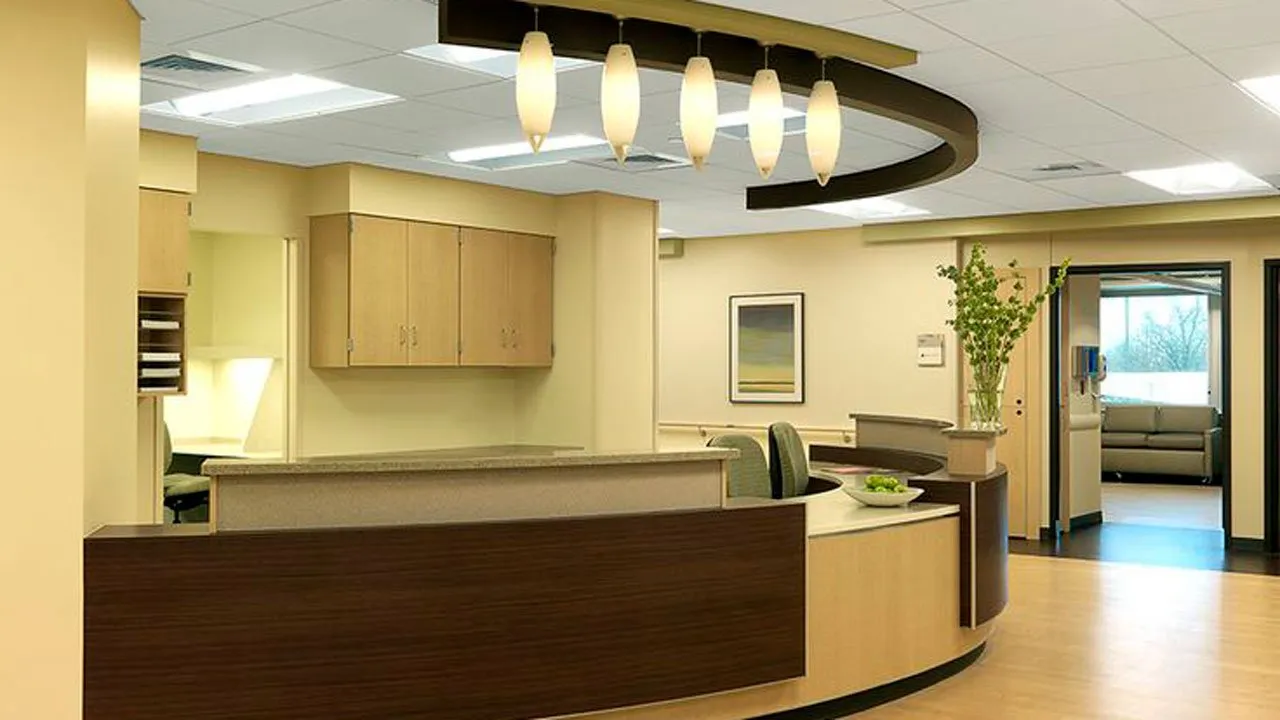Orthopedic Center, Healtcare Facilities

An orthopedic center, also known as an orthopedic clinic or orthopedic hospital, is a specialized medical facility that focuses on the diagnosis, treatment, and rehabilitation of musculoskeletal conditions. Orthopedic centers provide comprehensive care for patients with bone, joint, ligament, tendon, and soft tissue injuries or disorders. Here are key characteristics and aspects of orthopedic centers:
- Orthopedic Specialists: Orthopedic centers are staffed by orthopedic surgeons, physicians, and other healthcare professionals who are experts in the diagnosis and treatment of musculoskeletal conditions.
- Diagnosis and Imaging: Orthopedic centers use advanced diagnostic tools, including X-rays, MRI, CT scans, and ultrasound, to accurately diagnose orthopedic conditions.
- Orthopedic Surgery: Many orthopedic centers perform surgical procedures to treat various musculoskeletal conditions, such as joint replacements, arthroscopic surgeries, and spinal surgeries.
- Non-Surgical Treatments: In addition to surgery, orthopedic centers provide non-surgical treatment options, including physical therapy, rehabilitation, orthotics, and pain management.
- Sports Medicine: Orthopedic centers often have specialists in sports medicine who work with athletes and active individuals to diagnose and treat sports-related injuries.
- Pediatric Orthopedics: Some centers have pediatric orthopedic specialists who focus on the unique musculoskeletal needs of children and adolescents.
- Specialized Clinics: Orthopedic centers may include specialized clinics for specific conditions, such as hand and wrist, foot and ankle, spine, or joint replacement.
- Fracture Care: Orthopedic centers are equipped to treat fractures, dislocations, and other traumatic injuries.
- Rehabilitation Services: Many orthopedic centers have physical therapists who provide rehabilitation services to help patients recover mobility and strength after surgery or injury.
- Chronic Pain Management: Orthopedic centers offer pain management services for individuals with chronic musculoskeletal pain conditions.
- Arthritis and Joint Care: Orthopedic specialists at these centers often diagnose and treat arthritis, joint degeneration, and inflammatory joint conditions.
- Patient Education: Orthopedic centers provide education to patients about their conditions, treatment options, and preventive measures.
- Second Opinions: Patients often seek second opinions from orthopedic specialists when facing complex or serious orthopedic issues.
- Minimally Invasive Techniques: Orthopedic surgeons at these centers may utilize minimally invasive surgical techniques to reduce recovery time and scarring.
- Customized Treatment Plans: Care plans are tailored to meet the unique needs and preferences of each patient, ensuring individualized treatment.
Orthopedic centers play a crucial role in the healthcare system, helping individuals with musculoskeletal conditions regain mobility, reduce pain, and improve their overall quality of life. Their services range from diagnostic assessments to surgical and non-surgical interventions, catering to a wide spectrum of orthopedic needs.
Orthopedica Centers Provide a wide rande of Services
An orthopedic center is a specialized healthcare facility that focuses on the diagnosis, treatment, and management of musculoskeletal conditions and injuries. These centers are staffed with orthopedic specialists, including orthopedic surgeons, who are trained in the medical and surgical treatment of bone, joint, and muscle disorders.
Orthopedic centers provide a wide range of services to address various orthopedic conditions, including:
Orthopedic Consultations: Patients can schedule appointments with orthopedic specialists for initial evaluations and consultations. During these consultations, the orthopedic doctor will assess the patient’s condition, review medical history, perform physical examinations, and order diagnostic tests if necessary.
Diagnostic Imaging: Orthopedic centers often have advanced imaging technologies, such as X-rays, MRI (Magnetic Resonance Imaging), CT (Computed Tomography) scans, and ultrasound, to help diagnose and evaluate orthopedic conditions. These imaging techniques provide detailed images of bones, joints, muscles, and soft tissues, aiding in accurate diagnosis.
Non-Surgical Treatments: Orthopedic centers offer various non-surgical treatment options for orthopedic conditions. These may include physical therapy, occupational therapy, pain management techniques, medication management, bracing or splinting, and injections (such as corticosteroids or viscosupplementation).
Orthopedic Surgery: When conservative treatments are not effective or in cases of severe orthopedic conditions, orthopedic centers provide surgical interventions. Orthopedic surgeons perform procedures such as joint replacement surgeries (e.g., hip replacement, knee replacement), arthroscopy, fracture repair, spinal surgery, and other specialized orthopedic surgeries.
Rehabilitation and Physical Therapy: Orthopedic centers often have dedicated rehabilitation departments or work closely with physical therapists to provide post-operative rehabilitation and physical therapy services. These services aim to help patients regain strength, mobility, and function after orthopedic surgery or injury.
Sports Medicine: Many orthopedic centers have specialized sports medicine programs that cater to athletes and individuals with sports-related injuries. These programs offer comprehensive care, including injury prevention, diagnosis, treatment, and rehabilitation for sports-related orthopedic conditions.
Orthotics and Prosthetics: Some orthopedic centers have departments or partnerships with orthotics and prosthetics specialists. These professionals design and provide custom orthotic devices (such as braces, splints, or shoe inserts) and prosthetic limbs to support and enhance mobility for individuals with limb deficiencies or musculoskeletal abnormalities.
It’s important to note that the specific services and treatments offered may vary between orthopedic centers. It is recommended to research and choose an orthopedic center that has a good reputation, experienced specialists, and a comprehensive range of services that align with your specific orthopedic needs.
An orthopedic center is a specialized healthcare facility that focuses on the diagnosis, treatment, and management of musculoskeletal conditions and injuries. These centers are staffed with orthopedic specialists, including orthopedic surgeons, who are trained in the medical and surgical treatment of bone, joint, and muscle disorders.
Orthopedic centers provide a wide range of services to address various orthopedic conditions, including:
Orthopedic Consultations: Patients can schedule appointments with orthopedic specialists for initial evaluations and consultations. During these consultations, the orthopedic doctor will assess the patient’s condition, review medical history, perform physical examinations, and order diagnostic tests if necessary.
Diagnostic Imaging: Orthopedic centers often have advanced imaging technologies, such as X-rays, MRI (Magnetic Resonance Imaging), CT (Computed Tomography) scans, and ultrasound, to help diagnose and evaluate orthopedic conditions. These imaging techniques provide detailed images of bones, joints, muscles, and soft tissues, aiding in accurate diagnosis.
Non-Surgical Treatments: Orthopedic centers offer various non-surgical treatment options for orthopedic conditions. These may include physical therapy, occupational therapy, pain management techniques, medication management, bracing or splinting, and injections (such as corticosteroids or viscosupplementation).
Orthopedic Surgery: When conservative treatments are not effective or in cases of severe orthopedic conditions, orthopedic centers provide surgical interventions. Orthopedic surgeons perform procedures such as joint replacement surgeries (e.g., hip replacement, knee replacement), arthroscopy, fracture repair, spinal surgery, and other specialized orthopedic surgeries.
Rehabilitation and Physical Therapy: Orthopedic centers often have dedicated rehabilitation departments or work closely with physical therapists to provide post-operative rehabilitation and physical therapy services. These services aim to help patients regain strength, mobility, and function after orthopedic surgery or injury.
Sports Medicine: Many orthopedic centers have specialized sports medicine programs that cater to athletes and individuals with sports-related injuries. These programs offer comprehensive care, including injury prevention, diagnosis, treatment, and rehabilitation for sports-related orthopedic conditions.
Orthotics and Prosthetics: Some orthopedic centers have departments or partnerships with orthotics and prosthetics specialists. These professionals design and provide custom orthotic devices (such as braces, splints, or shoe inserts) and prosthetic limbs to support and enhance mobility for individuals with limb deficiencies or musculoskeletal abnormalities.
It’s important to note that the specific services and treatments offered may vary between orthopedic centers. It is recommended to research and choose an orthopedic center that has a good reputation, experienced specialists, and a comprehensive range of services that align with your specific orthopedic needs.
How do orthopedic centers cater to athletes and individuals with sports-related injuries?
Orthopedic centers cater to athletes and individuals with sports-related injuries by providing specialized sports medicine programs. These programs offer comprehensive care, including injury prevention, diagnosis, treatment, and rehabilitation for sports-related orthopedic conditions.
Here is how orthopedic centers cater to athletes and individuals with sports-related injuries:
Injury Prevention: Orthopedic centers focus on educating athletes and individuals about injury prevention techniques specific to their sport. This may include proper warm-up and stretching exercises, strength and conditioning programs, and guidance on proper technique and form.
Diagnosis: Orthopedic specialists in these centers have expertise in diagnosing sports-related injuries. They use a combination of physical examinations, medical history review, and diagnostic imaging techniques such as X-rays, MRI (Magnetic Resonance Imaging), and ultrasound to accurately diagnose the injury.
Treatment: Orthopedic centers offer a range of treatment options for sports-related injuries. These may include non-surgical treatments such as physical therapy, rehabilitation exercises, bracing or splinting, and medication management. In cases where surgery is necessary, orthopedic surgeons can perform specialized procedures to repair the injury.
Rehabilitation: Orthopedic centers have dedicated rehabilitation departments or work closely with physical therapists to provide post-injury rehabilitation services. These programs focus on restoring strength, flexibility, and function through targeted exercises and therapies. Rehabilitation may also include sports-specific training to help athletes return to their pre-injury level of performance.
Performance Enhancement: Orthopedic centers may offer performance enhancement programs for athletes looking to improve their athletic performance. These programs may include strength and conditioning training, sports-specific training, and guidance on nutrition and injury prevention strategies.
Team Approach: Orthopedic centers often have a multidisciplinary team of healthcare professionals, including orthopedic surgeons, sports medicine physicians, physical therapists, athletic trainers, and nutritionists. This team collaborates to provide comprehensive care and support to athletes and individuals with sports-related injuries.
It’s important to note that orthopedic centers tailor their services to meet the specific needs of athletes and individuals with sports-related injuries. They understand the unique demands of sports and work towards helping athletes recover and return to their sport safely and efficiently.
Sources:
American Academy of Orthopaedic Surgeons: “Orthopaedic Specialists”
Mayo Clinic: “Orthopedic Surgery”
Cleveland Clinic: “Orthopaedic & Rheumatologic Institute









